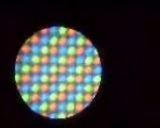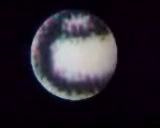Microscope: Difference between revisions
(Added details derived from the video snapshot.) |
|||
| Line 6: | Line 6: | ||
[[Image:Microscope capture 01.png|thumb|right|The XO display viewed with an XO microscope.]] |
[[Image:Microscope capture 01.png|thumb|right|The XO display viewed with an XO microscope.]] |
||
[[Image:Microscope capture 03.png|thumb|right|A printed "e".]] |
|||
[http://www.youtube.com/watch?v=wI28-IS9AII A video] of Mary Lou's prototype microscope attachment for the XO video camera. She compares the [[display|display of an XO]] and a typical ThinkPad. |
[http://www.youtube.com/watch?v=wI28-IS9AII A video] of Mary Lou's prototype microscope attachment for the XO video camera. She compares the [[display|display of an XO]] and a more typical ThinkPad. |
||
The microscope, which |
The microscope, which is said to have ~ 100× magnification, could be useful to analyzing water quality, among other things. |
||
== Details == |
|||
From the youtube video, it looks like the field of view is about 9.5 pixels, so 1.2 mm (because the screen is 200 ppi). |
|||
Pixels are about 130 um diagonally. |
|||
Some pixels are visibly rectangular, suggesting perhaps ~1/3 pixel resolution, or about 50 um. |
|||
A 50 um resolution would mean you could see amoebas (about the size of a pixel), and large plant cells, but most animal cells would be fuzzy dots (about 1/10 of a pixel). A human hair is slightly narrower than a pixel. |
|||
== Techniques == |
== Techniques == |
||
Revision as of 22:02, 5 August 2007
Overview - The $1 video microscope
With additional lenses, the XO can be used as a video microscope. A prototype $1 lens exists.
A video of Mary Lou's prototype microscope attachment for the XO video camera. She compares the display of an XO and a more typical ThinkPad.
The microscope, which is said to have ~ 100× magnification, could be useful to analyzing water quality, among other things.
Details
From the youtube video, it looks like the field of view is about 9.5 pixels, so 1.2 mm (because the screen is 200 ppi). Pixels are about 130 um diagonally. Some pixels are visibly rectangular, suggesting perhaps ~1/3 pixel resolution, or about 50 um. A 50 um resolution would mean you could see amoebas (about the size of a pixel), and large plant cells, but most animal cells would be fuzzy dots (about 1/10 of a pixel). A human hair is slightly narrower than a pixel.
Techniques
Magnification is often only the first step in being able to see details.
Aside from staining, a variety of techniques might be adapted to the XO. QX3 techniques suggests some possibilities.
Dark field microscopy
- Also known as "darkfield microscopy".
In direct sunlight, with a small square of black construction paper, it might be possible to do a form of dark field microscopy. As here.
Other microscopes
The XO has been used with the now-discontinued $100 Intel Play QX3 USB Microscope.[1]

